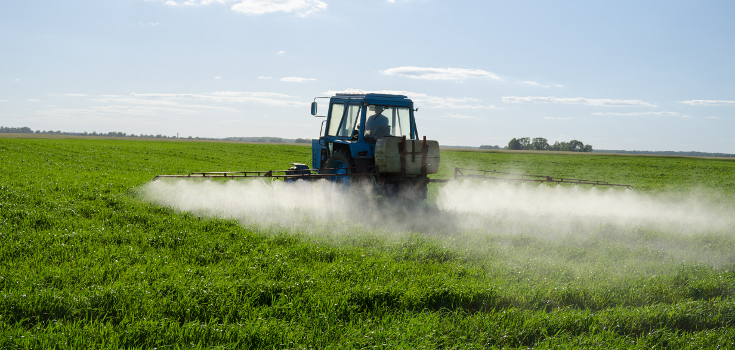Monsanto’s New ‘Herbicide-Resistant’ GMO Crop Slammed by Food Experts

With all the talk of Monsanto’s herbicide glyphosate, it is likely that you haven’t heard of dicamba. This is another weapon in the Big Ag giant’s chemical arsenal that is being called yet another indiscriminate chemical that “will take agriculture back to the dark days of heavy, hazardous pesticide use that will seriously endanger human health and the environment.”
Monsanto is sowing GMO cotton and soybean that were created specifically to resist the dicamba herbicide. This herbicide is the subject of great scrutiny following the U.S. Department of Agriculture (USDA)’s final Environmental Impact Statement (EIS) released last week.
Should both the EPA and USDA allow the as-yet-to-be-approved dicamba herbicide, the Center for Food Safety says it will pursue every legal option to make sure it is not used on US crops.
Dicamba is essentially Monsanto’s ‘solution’ to the glyphosate resistant crops that have already taken over US farmlands. Instead of yielding more food, glyphosate has caused an epidemic of super weeds that are so invasive that farmers in the Midwest cornbelt are dumbfounded. More than 60 million acres of US crops are now completely choked by glyphosate-driven super weeds.
A Little About Dicamba
Dicamba was first introduced in 1967 to be used as a broadleaf herbicide. Even then it was linked to higher cancer rates in farmers who used it, as well as birth defects in their male offspring. The herbicide is especially notable for its ability to drift into neighboring farms, thereby damaging crops.
Additionally, dicamba poses a threat to flowering plants and their pollinators. If dicamba was added to the already devastated crops throughout the cornbelt, it could dramatically escalate both environmental damage while negatively impacting human health greatly.
Strangely, though up for review by the FDA, the USDA itself and many scientists suggest that the massively increased use of dicamba will rapidly generate the still more intractable weeds resistant to both dicamba and glyphosate – all this for some more GMO frankenfood.
Bill Freese, Center for Food Safety science policy analyst says:
“Monsanto’s dicamba-resistant crops are the latest fruits of a pesticide industry strategy to increase sales of their toxic herbicides. Genetic engineering is making American agriculture more chemical-dependent and less sustainable than ever before.”
The USDA also just approved GE 2,4-D-resistant corn and soybeans from Dow Chemical Company, and approvals of similar herbicide-resistant crops developed by other pesticide companies are to come.
They aren’t making food, dear friends, they are making a poisoned world.

Pure unadulterated evil.
Not that I’m arguing with you but you wrote more here about the herbicide than the GMO food and “experts” slamming it. And, let’s go back to school: “sewing” is for needle and thread, where “sowing” is for seeds. As in “reap what you sow”. You’re on the right message, let’s please make sure it’s delivered well!
DEMIURGE- also see Ephesians 6:12 It explains what man cannot
(a)A supernatural being imagined as creating or fashioning the world in subordination to the Supreme Being, and sometimes regarded as the originator of evil
(b)Platonism the artificer of the world-a person who is skillful, clever in devising ways of making things;inventor
(c)In many states of ancient Greece- a public official or magistrate
Keep that Serenity prayer on your lips and guard your conscience with the Word: warned by its Truth to every spirit that hears it. Father Forgive them for …. such loving, sadness in Power and Glory to Jesus Christ for taking the helmet of salvation and the sword of Spirit, which is the word of God Amen